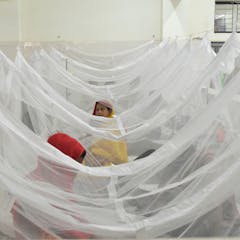
Articles on Mosquitoes
Displaying 1 - 20 of 195 articles

Sometimes it seems the night is just buzzing with insects. But are there really more insects out at night? We analysed all the evidence on insect activity across the day–night cycle to find out.

Authorities have issued warnings for people in parts of Western Australia to avoid mosquito bites after Murray Valley encephalitis virus was detected in local mosquitoes. Here’s what you need to know.

Female mosquitoes don’t want to lay their eggs alone, but they don’t want sites that are too crowded either. Understanding what guides their choice could inform new control strategies.

New research shows mosquitoes spread Buruli ulcer. So reducing mosquito populations and avoiding bites is critical.

It’s hot and humid. With mosquitoes about, applying insect repellent creams, sprays and lotions may not feel good. But how do the alternatives stack up?

Climate change is causing dengue-carrying mosquitoes to spread. Could the disease become endemic in Europe?

Puddles are an often-ignored but crucial habitat for rare and unusual wildlife.

Heat, floods and droughts create conditions for pathogens and their vectors.

This summer is expected to be dry and hot. Here’s what that means for the risk of mosquito-borne diseases.

The Sahel region is grappling with an outbreak of the deadly mosquito-borne disease.

Early warm weather has triggered a bumper season for Australia’s 30,000 fly species.

Something unusual seems to be happening with dengue, a potentially fatal mosquito-borne viral disease.

People have been trying to make malaria vaccines for over 100 years. With the help of the revolutionary new R21/Matrix vaccine the disease could be eradicated by 2040.

West Nile virus arrived in North America in 1999 and spread across the continent by 2005. Here’s what you need to know about this mosquito-borne pathogen.

Warm weather has arrived and that means our annual battle against mosquitoes is back on. Here are five ways to mosquito-proof your backyard that don’t rely on spraying insecticides.

Methods that don’t rely on insecticides are needed to bolster the fight against mosquito-borne diseases.

Two mosquito physiology experts explain which repellents work better than others and how to protect yourself this summer.

After recent cases in Florida and Texas, authorities are advising the public to drain standing water sources to keep mosquitoes from multiplying.

An expert on mosquito ecology provides top tips to avoid being bitten by these pesky insects.

Nigeria must do more to reduce its high malaria burden.
